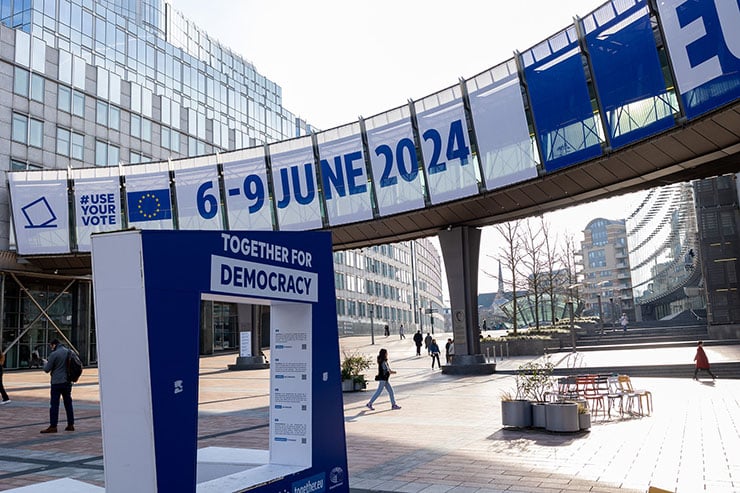“Now this is not the end,” Winston Churchill memorably declared after the battle of El Alamein. “It is not even the beginning of the end; but it is, perhaps, the end of the beginning.”
The same applies to the results in the European Parliament election held on Sunday, June 9, which saw outright victories for the right in France, Italy, Belgium and Austria, and major gains in the Netherlands and Germany.
The result set off a snap election and a political crisis in Paris. There was but a moment of shocked disbelief in Berlin, however, where the humiliated ruling coalition quickly decided that it would go on as if nothing untoward had happened.
President Emmanuel Macron dissolved the French parliament after Marine Le Pen’s patriotic, antiglobalist (i.e. “far-right”) National Rally party won close to one-third of the popular vote, its best result thus far in a nationwide contest. National elections will be held on June 30.
The crushing blow for the would-be-Napoleonic French president came just as neighboring Germany saw the “far-right” Alternative for Germany (AfD) party celebrate a truly historic second-place finish, well ahead of Chancellor Olaf Scholz’s Social Democratic Party (SPD) and his coalition partners.
Even in Belgium, a country of far lower significance, Prime Minister Alexander De Croo submitted his resignation as not one but two Flemish nationalist parties, both EU unfriendly, have done exceedingly well.
Latent dissatisfaction with the EU is the main cause of the result. People are voting against a plutocratic, illegitimate superstate devoid of democratic credentials or purpose. This angst was channeled into a major upset for the ruling establishment. Routinely demonizing Euroskeptics and immigration realists no longer works.
It is an even bet that on June 30 Le Pen’s Rassemblement National will win and prematurely end the presidency of Emmanuel Macron. Either he will become a lame duck, or he will leave. On Sunday, Le Pen’s party received twice as many votes as Macron’s. This is, above all, a living testimony to the lack of enthusiasm among his country’s electorate for Macron’s absurd warmongering over Ukraine. He seems ready to repeat Napoleon’s feat of 1812, but the French are pragmatic people, commendably able to weigh the costs and benefits of their leaders’ designs.
The shift to the right in the EU is remarkable, particularly in some of the smaller countries. In Austria, the Freedom Party (FPÖ) came first in a nationwide election for the first time—a harbinger of the elections to the National Assembly in the autumn. Even in Germany, where AfD leader Maximilian Krah was prone to gaffes and his party was demonized in the media, the AfD achieved its best nationwide result ever, taking second place and leaving all three government parties behind. The German left’s so-called “traffic light coalition” got under one-third of the vote, but a government resignation—like in neighboring France or Belgium—was deemed out of the question.
This morning (Monday, June 10) I drove from my Swiss abode to the lovely medieval city of Constance in Germany, where life went on as normal. Several morning paper headlines focused not so much on the election result as on the refusal of the federal government to even consider early elections to the Bundestag. “The election date is set for autumn next year, and we plan to do so,” government spokesman Steffen Hebestreit told reporters. The ruling coalition is determined to remain during its four-year term.
In the same vein, Social Democratic Party (SPD) General Secretary Kevin Kühnert claimed his party does not see any need for new elections. “We win together and we lose together, that is our common election defeat,” said Kühnert after a meeting of the SPD executive committee. The party’s Chancellor Olaf Scholz, whose ratings are abysmal, is safe for now. The system is determined not to allow the electorate to impact its will to power.
Despite the election results, the next EU Commission will be, yet again, dominated by leftist globalists, harassing the Europeans with absurd climate protection and chaotic immigration rules which favor population replacement. Commission members, let us recall, are nominated by the member-state governments, not the EU Parliament. So much for democracy.
Absurdly enough, if Ursula von der Leyen does not become Commission President again, the German EU Commissioner will come from the biggest election loser: the Greens, in the person of one Anton Hofreiter, a caricature of a post-modern, post-human, post-rational politician. For these people “saving democracy” means denying reality and demonizing deplorables.
The AfD has won—at least in terms of percentage points and seats. This is the most important result of the EU election by far. Despite the establishment-sponsored mass demonstrations “against the right” since the beginning of the year, despite the bogus, state-sponsored scandals surrounding allegations of espionage and bribery, despite extensive anti-AfD media campaigns and supine responses from major businesses, Alternative for Germany has done well. This is a major success for Germany’s bête noire.
The German Greens, a truly nasty and evil party if ever there was one, have made this outcome possible. Since the late 1990s this has been a party of self-hate, which abandoned its allegedly ecological roots for the Gramscian Wille zur Macht (will to power). It rejects political competition or debate, favoring outright slander of opponents and quasi-moral screams over debate.
Whatever happens in France (let alone Belgium, Austria, Italy, etc.), Germany is the key. The socialist-green-liberal cabal, totalitarian and brazen, has not been beaten badly enough yet. The self-hating climate nuts, migrant traffickers, Jihad apologists, and gender idiots will continue the madness, because (as per Martin Luther at Worms) they can do nicht anders (nothing else).

Leave a Reply